Column One: Breast cancer stalked every woman in her family. She was determined it wouldn’t get her

Alejandra Campoverdi says she has never known a time without breast cancer. It has afflicted her grandmother, mother and aunt. After testing positive for the BRCA2 gene mutation, she elected to get a double mastectomy to reduce her risk of contracti
- Share via
Alejandra Campoverdi forged a path for herself that some only dream of, turning humble beginnings into a life of poise and power.
She had been that perfect student who made it to USC and then Harvard against all odds. She turned a volunteer position with then-Sen. Barack Obama’s presidential campaign into a post at the White House.
She added high-profile media jobs with Univision and the Los Angeles Times to her resume and made a mighty but unsuccessful run for Congress. In campaign materials, Campoverdi was a natural, flashing a smile with her head held high, her silky brown hair primped just right.
She did all this despite the disadvantages she faced having been the daughter of immigrants, raised on welfare. But something was looming in Campoverdi’s life, in her blood, that had the power to take all of that away.
Breast cancer was attacking every woman in her life.
The disease stole her great-grandmother Maria Elena Uribe when she was in her 70s. It came after her grandmother in her 60s and then her mother at age 49. One aunt survived cancer a few years ago; another just finished treatment in February.
It seemed only a matter of time before it came for her. But Campoverdi’s approach to the deadly disease typified a generational shift. While others in her family ignored a lump, or let the doctors take the lead, Campoverdi said she decided to become “the CEO of her own body.”
In 2014, Campoverdi tested positive for a mutation in her BRCA2 gene, confirming what she already knew: A high risk of breast cancer ran in her blood.
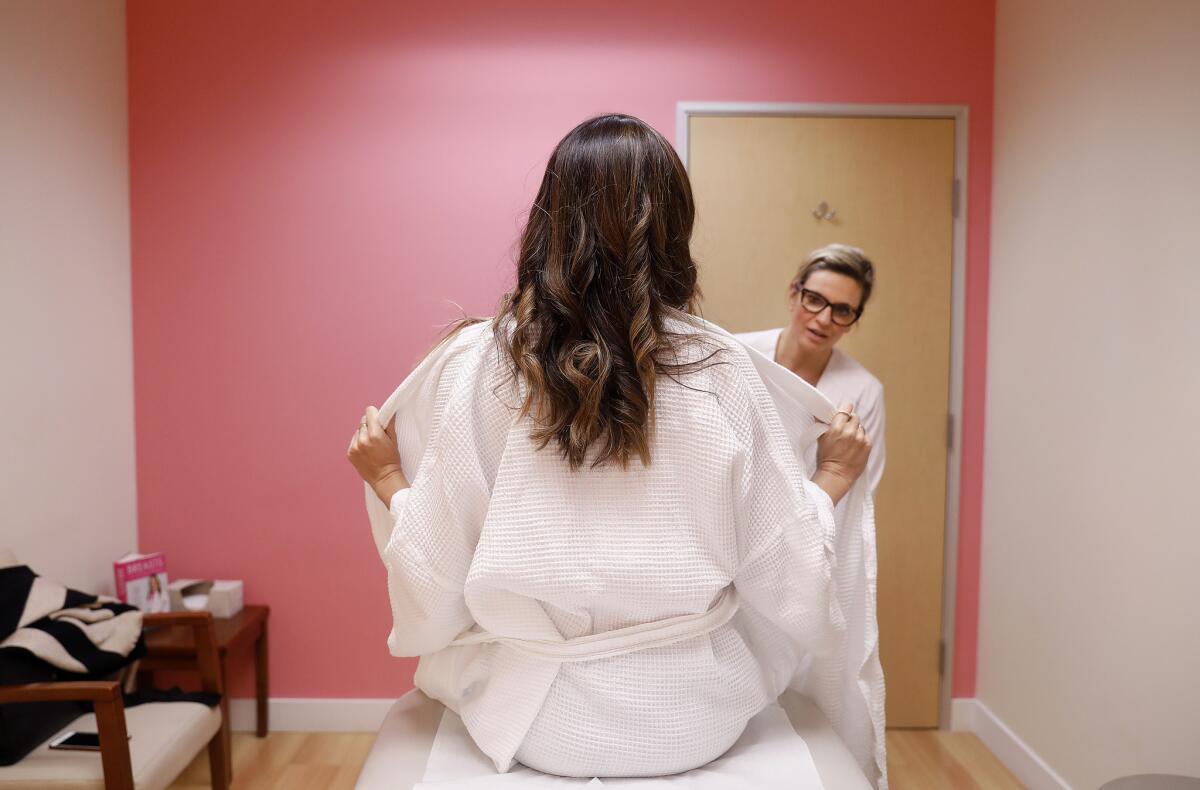
Campoverdi dove into researching and consulting with doctors about what she should do next. She met with the man who discovered BRCA2 gene mutations and interviewed him for a documentary on the subject that she executive produced. She launched initiatives to make sure the path for others behind her would be a little bit easier.
Through social media, Campoverdi memorialized each step of her breast cancer crusade and agreed to let Times journalists chronicle her medical journey over many months. Last fall, at age 39, she decided to go forward with a double mastectomy that would reduce her risk of getting cancer from 85% to less than 3%.
Tests failed to find any traces of disease in her body, but Campoverdi decided she was going to get breast cancer before it got her.
Campoverdi grew up in a cramped, rent-controlled apartment in Santa Monica, with up to eight family members living there at a time. She was surrounded by women, and her father was absent from her life. Any loss was filled by her grandmother’s doting.
Maria Louisa Medellin — her Abi, short for abuelita — walked her to school each morning after a prayer. For years, on their walks, Medellin made it a habit to bring coffee each day to a homeless man they knew as King Edward.
Despite her desire to give rather than receive, Medellin depended on financial help from family to pay for rent and necessities, Campoverdi said. Health insurance was a luxury she couldn’t afford. And besides, going to the doctor was for sick people.
So when her grandmother discovered a lump in her breast, she didn’t add a burden to the family.
She said nothing.
She did nothing.
When her grandmother finally got medical treatment, Campoverdi had just been cast to be the lead in a high school musical, Polly Baker in “Crazy for You.” Drained by the chemotherapy, her grandmother was asleep when Campoverdi left for class in the morning, and when she returned home from rehearsing in the evenings.
Medellin grew frail, lost all her hair and became 80 pounds lighter. She did manage to will herself out of bed one day, though. She bought a pearly blue rosary and walked to her church, where she had it blessed, and returned to her bed with the gift for her granddaughter. Medellin died the morning Campoverdi’s play debuted.
“It destroyed me,” Campoverdi said. “How much more time I wish I could have spent with her.”
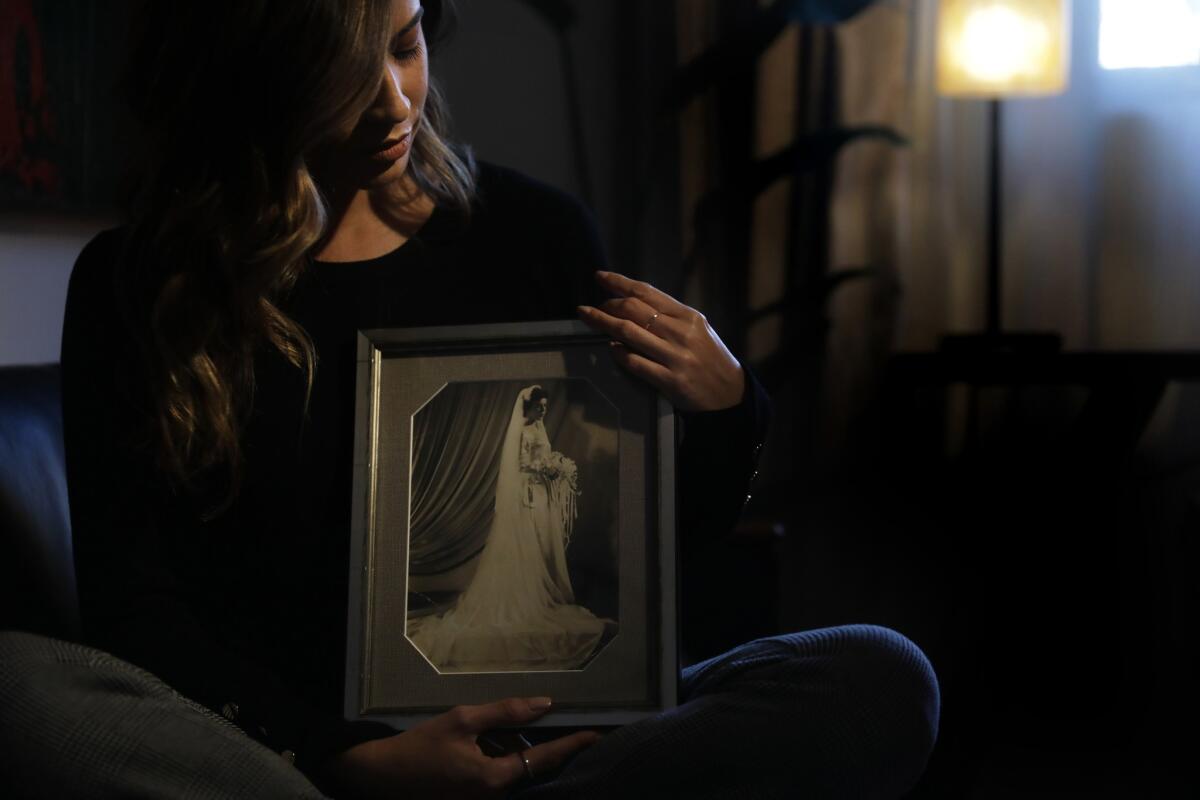
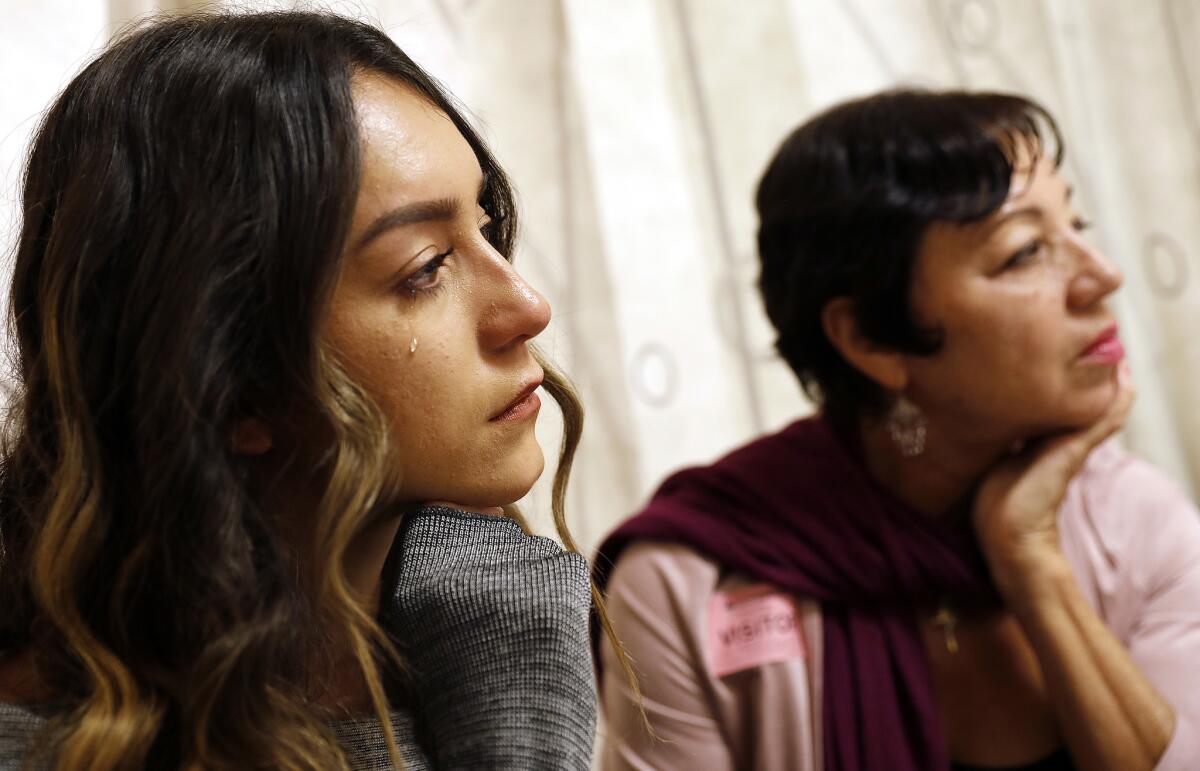
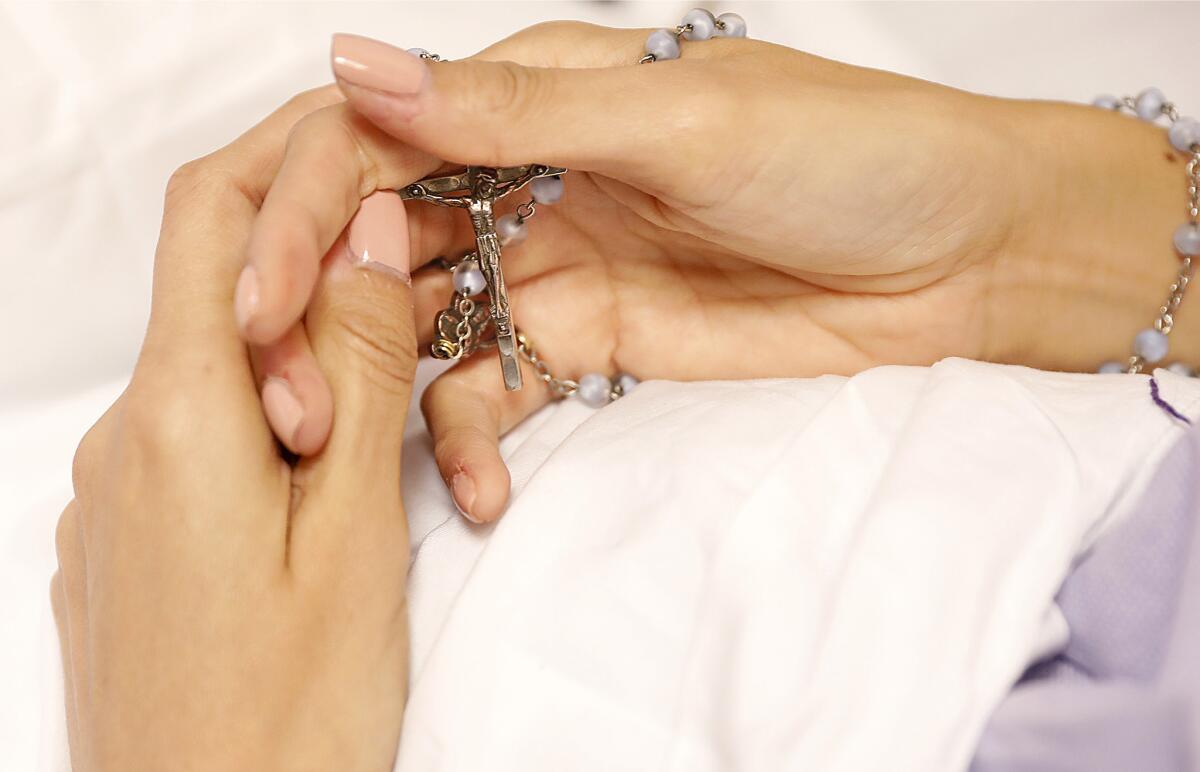
Campoverdi struggled on, as the women in her family have always done. She finished high school racking up a list of accomplishments — class president, homecoming queen, high honors and more. To make ends meet, she worked as a model and actress while studying at USC. Then, after Campoverdi graduated, her mother, Cecilia Medellin, was diagnosed with breast cancer.
“I was ... trying to make sure to wrap my head around what could potentially be my new reality.”
— Alejandra Campoverdi
It turned out that the same stubborn doggedness she learned from the strong women around her proved to be one of her biggest challenges as she became her mother’s caretaker. Cecilia Medellin informed her daughter one day that she would not go through with chemotherapy, despite her doctor’s insistence. She didn’t think she could take it.
Things grew tense between mother and daughter. They didn’t speak for a time, resorting to writing emotional letters to each other.
“I was obviously petrified of the idea of losing my mother, but also trying to make sure to wrap my head around what could potentially be my new reality,” Campoverdi recalled. She worried that while still in her 20s she would have to serve as the mother of her younger sister.
Her mother eventually relented and went through with the treatment, and a lumpectomy eliminated the cancerous tissue.
Behind the story: For a daughter of immigrants, a story stirs up memories of her own famliy »
Years later, as Campoverdi’s chances of developing cancer increased with age, she urged her mother to get tested to see whether she had any BRCA mutations that put her at greater risk for the disease.
Her mother hesitated before finally accepting in 2014. The test, unsurprisingly, came back positive.
“That’s when I decided to get tested,” Campoverdi said.
Five years earlier, she started at the White House and eventually became the first deputy director of Hispanic media. From 2014 to 2016, she was director of video initiatives at the Los Angeles Times and managing editor of a multicultural effort called #EmergingUS. She went on to become senior advisor to Mellody Hobson, who is vice chairwoman of Starbucks and married to George Lucas.
Campoverdi ran for California’s 34th Congressional District in 2017 with a primary platform of universal healthcare. In her first campaign video, her mother sat beside her as she spoke publicly for the first time about being a BRCA gene mutation carrier.
“As an aide in the Obama White House, I proudly worked to help pass Obamacare because I knew it would save lives. I never imagined one of those lives might be my own,” she said in the ad. “This debate isn’t about politics. It’s personal for millions of Americans.”
She didn’t win the primary, but her planned double mastectomy became her next campaign.
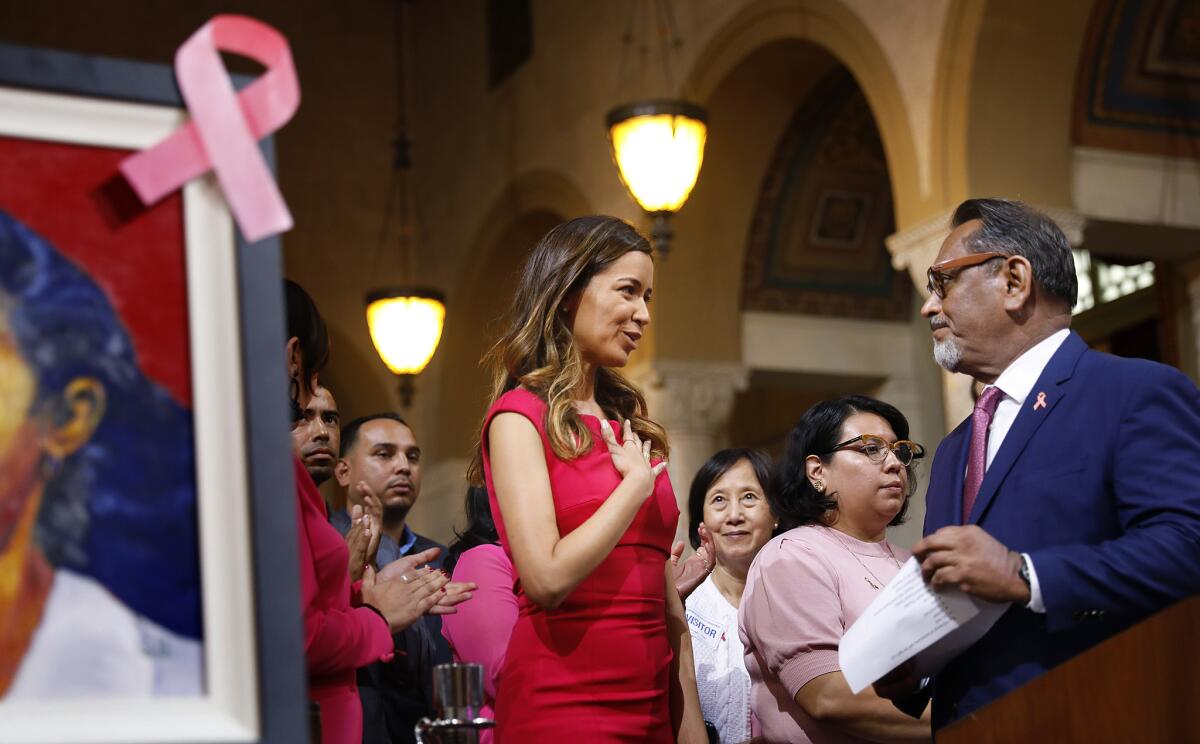
Leveraging Instagram’s worldwide reach, Campoverdi documented moments leading up to her surgery and bonded with women over their shared experience. Her feed is topped with highlights — labeled “Surgery Prep,” “Surgery,” “Recovery” and “Holistic Health” — and she details the vitamins, celery juice cleanses and other products for her followers.
In one post, there’s a photo of her body being covered in white paste. She had a cast made of her torso — to be plated in bronze and held as a memory of Campoverdi’s body before major surgery.
There are photos of her at Abi’s grave, which she visited often to pray before the surgery in October. “Be with me, be with me, be with me,” she chanted to the tombstone, the pearly blue rosary wrapped around her hands.
As she prepared for surgery, Campoverdi made sure to pick up two of everything, thinking of her aunt, who was to go through the same experience just weeks after her. Campoverdi’s surgery was to employ an innovative method created by her surgeon, Dr. Kristi Funk, whose patient roster includes Angelina Jolie.
Campoverdi would first get a “nipple delay,” a procedure in which the full mastectomy incision is made and a portion of skin is lifted off the breasts to induce increased blood flow and reduce the risk of complications for the primary surgery weeks later.
She recognizes that she is privileged, able to work with the best doctors and navigate her care with relative ease. Cultural factors, such as religion and family, may keep Latinas from getting tested, and economic disparities may prevent many from getting health insurance.
Everyone, men and women, has two genes known as BRCA1 and BRCA2. Latinas are not necessarily more likely to be carriers of a harmful mutation in either BRCA1 or BRCA2, or to be diagnosed with breast cancer compared with other ethnic populations. However, they are less likely to get preventative testing, such as mammograms, and are often diagnosed at later stages, said Susan Domchek, executive director of the Basser Center for BRCA at Penn Medicine.
That’s why Campoverdi started the Well Woman Coalition, an initiative she hopes to use to empower women of color to take control of their health. She also partnered with the Basser Center for BRCA to launch Latinx & BRCA, the first awareness campaign on the BRCA gene mutation that targets Latinos and offers Spanish-language educational materials.
Hooked up to an IV in a hospital bed, Campoverdi sat in a tiny curtained-off room at Providence St. John’s Health Center in Santa Monica surrounded by the hospital’s hum and cream-colored walls.
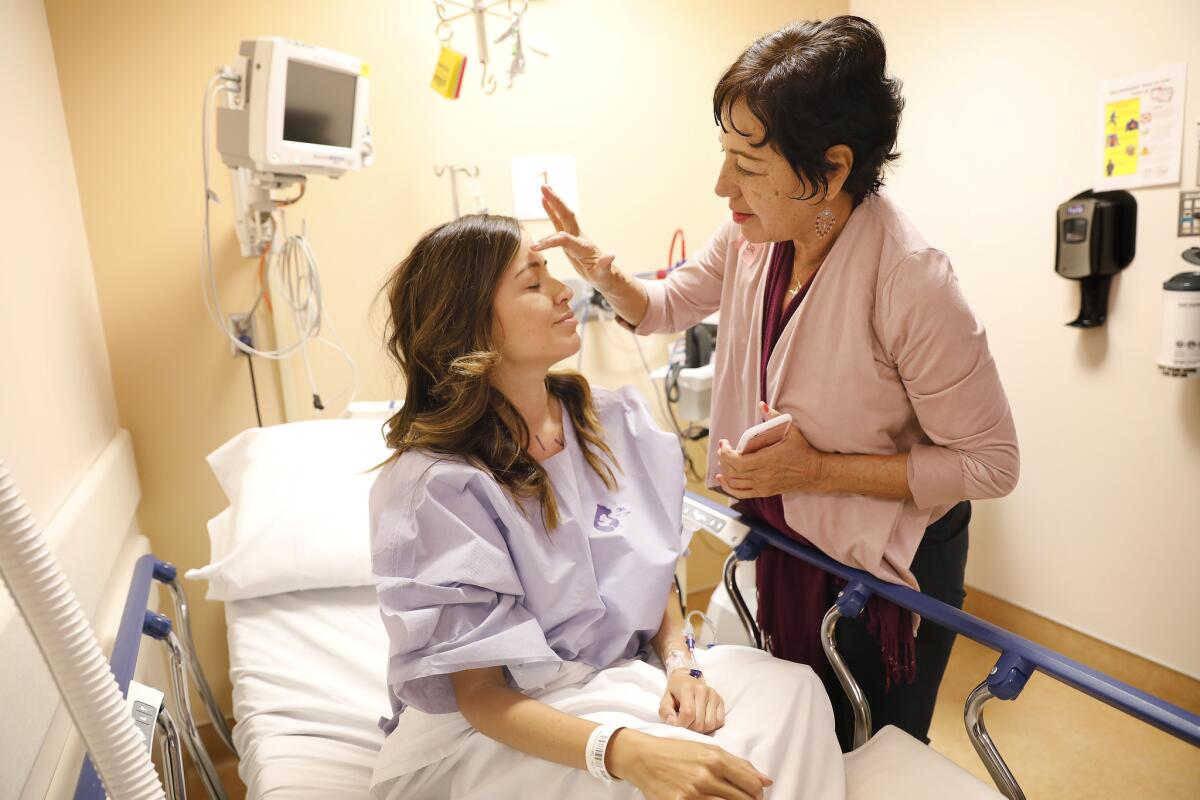
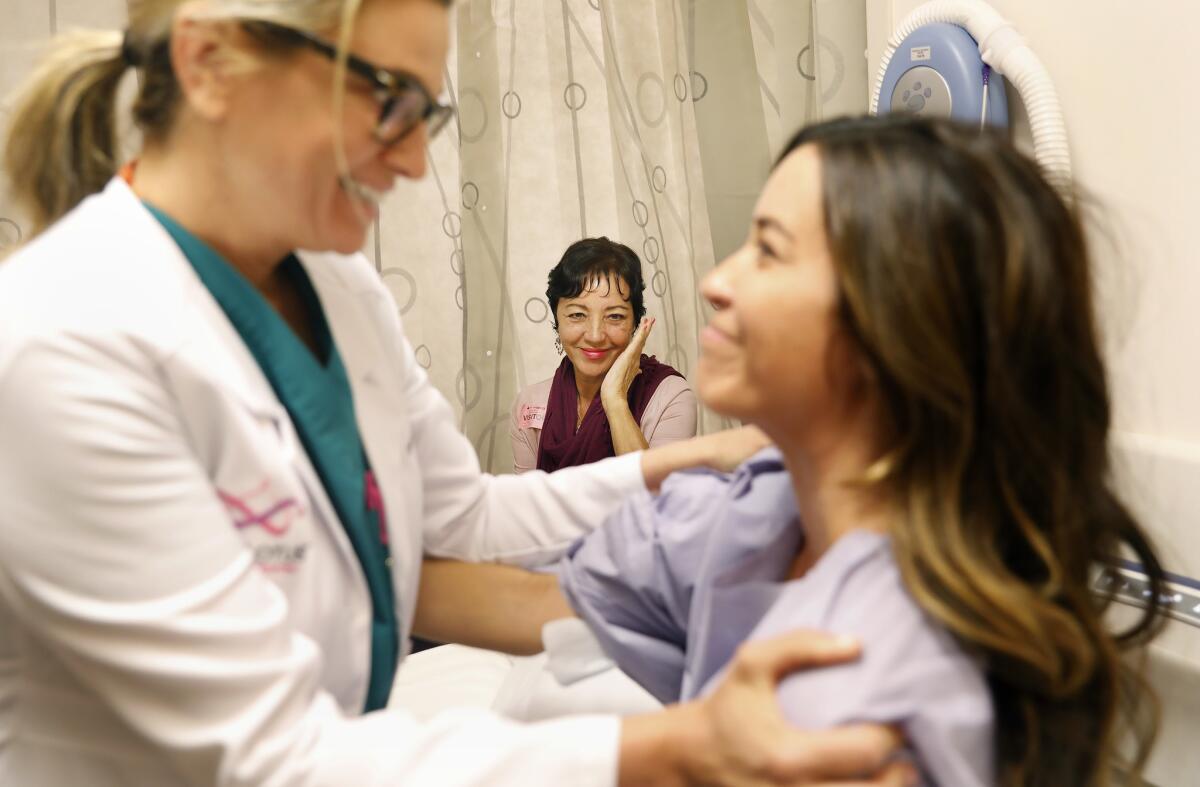
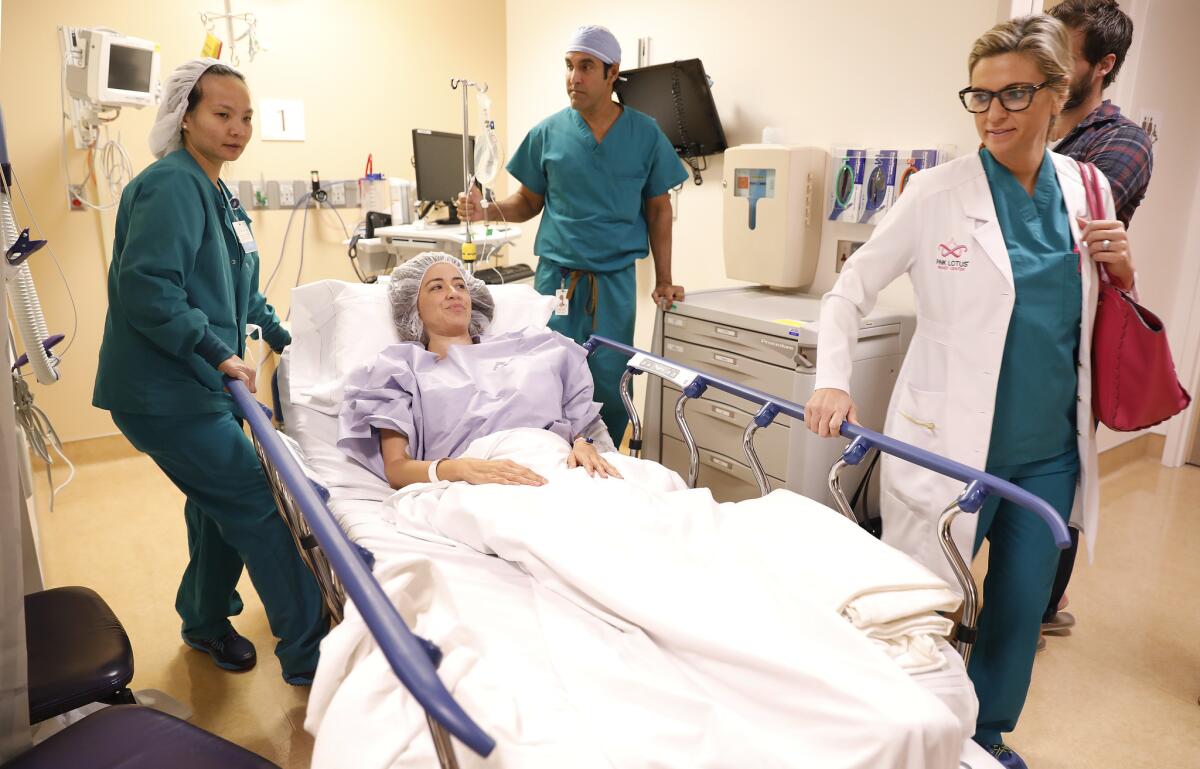
Videographers pointed cameras at her, following her every move for the documentary she was producing. Even in a hospital gown, Campoverdi was at ease, and her hair shone. Knowing she wouldn’t be able to shower or get a manicure anytime soon, she had gone to a hair appointment the morning before the surgery. Her nails were perfectly pink, as were her mother’s and sister’s.
Her mother looked up from her laptop, then down again. She was reading a poem she had written for her daughter when Campoverdi had just gone through her first surgery as a child, for scoliosis.
“Would you like to hear it?” her mother asked, and began reciting:
Your love rivers in my veins
Bursting them with pride
Play me a love song piano girl
You are not the princess
You are the … pyramid
After taking selfies with her doctors, Campoverdi was rolled away into the operating room for the five-hour surgery that would remove and reconstruct her breasts. In the operating room, Campoverdi would recall later, she felt resolved and at peace. There, with that pearly blue rosary interlaced between her fingers, she felt her grandmother with her.
The surgery went well, and in between the bed rest, vitamins and celery juice cleanses that followed — documented on Instagram, of course — Campoverdi had nearly forgotten about a post-op call she was supposed to get from her doctor. As a matter of routine, the breast tissue removed during surgery was closely examined, and her doctor, Kristi Funk, was to call her with the results.
The call came six days after her surgery. She wasn’t worried.
Women who have their breasts removed never learn whether, in the end, it truly saved them. Without surgery, it might have been five years or 10 years before they were diagnosed. Maybe it would have been never.
Then Campoverdi’s doctor spoke, and the woman used to being in control suddenly found herself struggling to follow as the blood rushed to her head.
“I’m sorry, you’re going to have to repeat everything you just said,” she told her doctor.
“You had cancer,” Funk said.
As Campoverdi would recount later, her cancer was so small that it was considered “stage zero” — hidden within her milk ducts and undetectable by every mammogram, every MRI, every ultrasound.
If she’d had any lingering doubts about the radical surgery beforehand, she certainly didn’t have them now.
“I saved my own life,” she said.
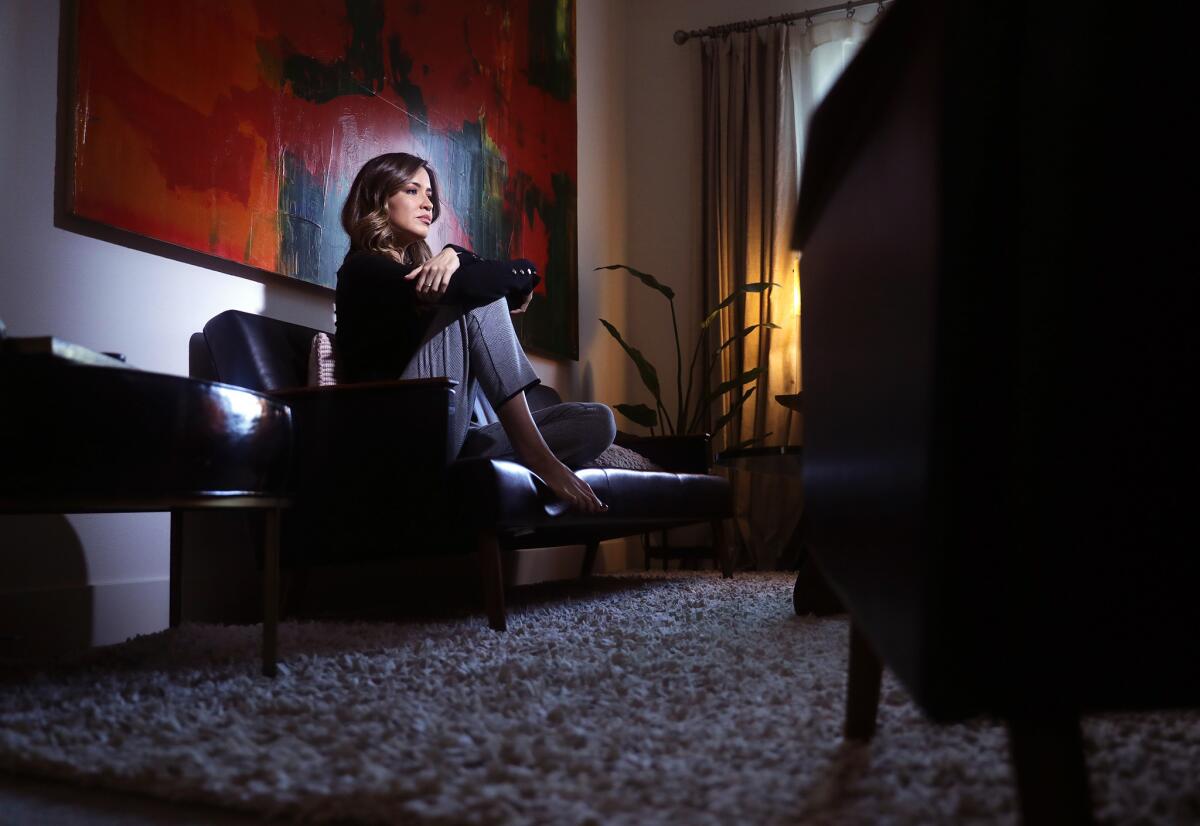
Produced by Jessica Perez.
alejandra.reyesvelarde@latimes.com
Twitter: @r_valejandra
Sign up for Essential California
The most important California stories and recommendations in your inbox every morning.
You may occasionally receive promotional content from the Los Angeles Times.








